Bosses of high street agencies, homeworkers, operators and OTAs speak at Travel Weekly event. Lee Hayhurst reports
‘Free extras and social spur holiday purchase decisions’
New Google research has found that while brand remains important when holidaymakers are looking for package holidays online, it is not the defining influence.
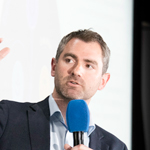 Recommendations on social networks and industry body ‘kitemarks’ or awards serve as short cuts for customers in the decision‑making process, the search giant’s research suggests.
Recommendations on social networks and industry body ‘kitemarks’ or awards serve as short cuts for customers in the decision‑making process, the search giant’s research suggests.
Also influential in the package sector is ‘the power of free’ – added value such as free nights or all‑inclusive – Google senior industry head Ruairidh Roberts told last week’s Travel Weekly Business Breakfast.
Roberts said the Google research was part of a first scientific study of the “messy middle” – the phase of consumer travel buying between initial inspiration and booking.
“TV, press and above-the-line channels create triggers at the bottom at the purchase point, where Google plays an important role,” he said.
“What we have not really looked at, and we know this is critical to the buying cycle, is this messy middle.
“The buying cycle for travel can be up to 70 days – it can take weeks or months – and often it involves more than one person.”
Roberts said Google’s research, based on 100,000 experiments, would help brands understand the unconscious factors that determine why people make buying decisions.
The search giant will produce a full report this summer including insight into five travel sectors: packages, hotels, short-haul flights, long-haul flights and car hire.
Hinting at early results, Roberts revealed: “In hotels it’s a much more cluttered market than holidays and differentiation is harder to deliver, so additional free components work much more to influence unconscious decision-making.”
He added that by offering certain combinations of triggers, firms can successfully enter a market with “zero brand identity” and “still win” without having to invest in a brand building campaign.
Rowland: Move marketing from above the line to social media
Travel agents must improve the way they use social platforms to market their products and services as the impact of traditional press, TV and other consumer media declines.
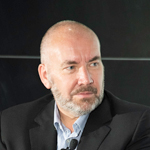 Alistair Rowland, chief retail officer for specialist business at The
Alistair Rowland, chief retail officer for specialist business at The
Midcounties Co-operative, said that today’s world is “all about inspirational and aspirational content”.
He added: “The days of above-the-line press and media are at an end. Marketing is social in all channels.
“Legacy agency groups need to move marketing from above the line to social. I think perhaps things are changing faster than we are managing it.
“They [agents] need to be better at Instagram as well as Facebook for the next generation. Inspiration is part of our future and it’s relevant.”
Abta board member Rowland said that, although influences are changing, brand remains important to give people the reassurance to make
a purchase decision.
“People are confused,” he said. “They love content, but they want something to get them over the line.”
‘Abta has made InteleTravel better’
The boss of controversial US homeworking firm InteleTravel said gaining Abta accreditation had made it “a better company”.
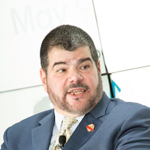 The agency, which says it now has 2,500 agents in the UK, up from 1,800 in March, was accepted unanimously by the trade association’s membership committee last month after a two-year application process.
The agency, which says it now has 2,500 agents in the UK, up from 1,800 in March, was accepted unanimously by the trade association’s membership committee last month after a two-year application process.
President James Ferrara said: “Coming from the States where we do not have the same kind of regulation of the industry you have, Abta has won my respect. We are a better company now as a result of the Abta process.”
Agents’ knowledge gives them edge over influencers
Professional agents’ detailed knowledge of their customers is their edge when faced with the increasing threat of online influencers with no travel expertise.
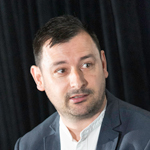 Andy Washington, senior travel vice-president at Culture Trip, said there is a “shift towards influencers”.
Andy Washington, senior travel vice-president at Culture Trip, said there is a “shift towards influencers”.
Web giants such as Facebook and Instagram are creating “contextual commerce” purchasing opportunities at the click of a button or voice command, he said, and tipped this to become the norm. But he said agents can be influencers on these platforms, as they have been in high street stores.
“We are all influencers,” said Washington, who has previously worked for dnata Travel, Expedia and lastminute.com. “Telling stories works very well for top-of-the-funnel engagement, then we get to this messy middle. Think about the moment these people would come into a shop. You know about them – their history, their budget – and start telling their story with them.
“A poor travel agent, who is licensed and just takes an order – what’s the difference between them and an influencer?”
InteleTravel’s James Ferrara said recommendation from a human is preferable to a machine and new models enabling this are emerging. But he said there was no point “railing against the heavens, fighting the change” as more “real people” get involved in making recommendations. “That’s what we do,” he said.
Rowland said we are seeing the birth of the “super-agent”, who is the influencer and “becomes the brand” by sharing video and other content.
But he urged operators to give accredited agents more support than so-called “referral agents” who pass on leads for direct bookings.
Olympic Holidays chief executive Clare Tobin said apprentice agents were “working completely differently to anyone else in their branches” and revealed the operator was looking to work with a new generation of high‑end “concierge” lifestyle agents.
Olympic: We will use all channels for marketing
Destination specialist Olympic Holidays is diversifying its marketing mix to embrace celebrity influencers as it looks to move to higher-value travel and experiential product.
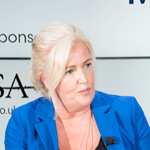 Chief executive Clare Tobin said the operator was targeting a 30-plus demographic with high disposable income, moving away from its traditional 45-plus market, and pushing niche areas such as weddings, honeymoons and island-hopping.
Chief executive Clare Tobin said the operator was targeting a 30-plus demographic with high disposable income, moving away from its traditional 45-plus market, and pushing niche areas such as weddings, honeymoons and island-hopping.
She said this requires embracing channel
diversity, such as its recent campaign with former BBC Blue Peter presenter Katy Hill, and revealed plans to recruit a Love Island contestant as an influencer.
“Gone are the days when consumers sit outside travel agents on Boxing Day waiting for an offer,” she said.
Tobin said that while Olympic has product with inspirational imagery and video that lends itself to being promoted on Instagram, it also had to compete on price to stand out in search.
Olympic’s sales are still 50% through agents, but Tobin said: “I believe the consumer has moved on. We will look at all channels. We have to.
“We have a fantastic relationship with agents and I hope that will continue. But the consumer needs to have that choice.”
Gallery: The Future of Travel Selling event
